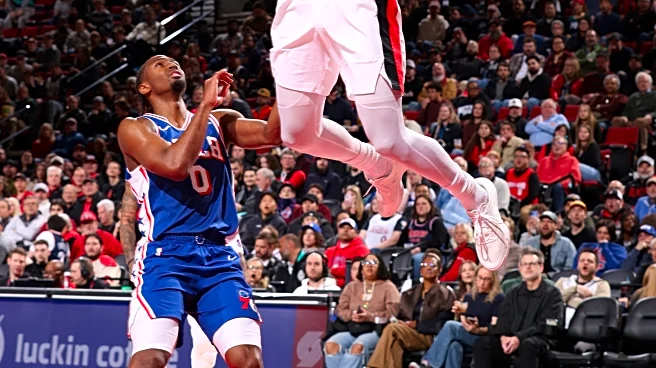What's Happening?
Carlie Irsay-Gordon, co-owner of the Indianapolis Colts, played a significant role in the recent trade involving star cornerback Sauce Gardner from the New York Jets. Known for her active participation
in team operations, Irsay-Gordon is often seen on the sidelines with a headset and playsheet, demonstrating her commitment to understanding the complexities of NFL ownership. Her involvement in the trade process was detailed by ESPN's Stephen Holder, who noted that Irsay-Gordon's immersion in football operations gave her the confidence to authorize the trade. The Colts exchanged two first-round picks and receiver Adonai Mitchell for Gardner, with Irsay-Gordon providing final approval after extensive discussions with General Manager Chris Ballard.
Why It's Important?
Irsay-Gordon's active involvement in team decisions marks a departure from the typical role of NFL owners, who often only provide a stamp of approval for major deals. Her hands-on approach could influence the Colts' strategic direction and decision-making processes, potentially leading to more informed and effective management. This involvement may also set a precedent for other team owners, encouraging them to engage more deeply with their teams' operations. The trade for Sauce Gardner is a significant move for the Colts, aiming to strengthen their defense with a two-time All-Pro player, which could impact their performance in upcoming seasons.
What's Next?
Following the successful trade, Irsay-Gordon is expected to make another major decision regarding quarterback Daniel Jones. Jones, who was given a prove-it contract, has demonstrated his value with a standout season, prompting discussions about a potential nine-figure contract. Irsay-Gordon's informed and involved approach positions her well to make this critical decision, which could further shape the Colts' future and their competitiveness in the league.
Beyond the Headlines
Irsay-Gordon's approach to team management may influence the broader NFL landscape, encouraging a shift towards more engaged and informed ownership. This could lead to changes in how teams are managed and operated, potentially improving team performance and fan engagement. Her involvement also highlights the evolving role of women in sports leadership, challenging traditional norms and paving the way for greater diversity in executive positions.










